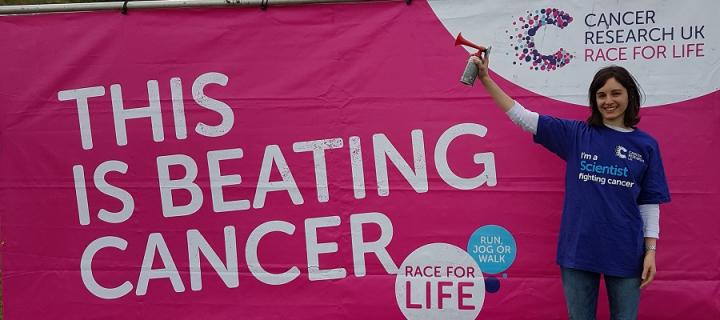Race for life start in celebration of £1.5million grant
Dr Evi Theodoratou has been awarded £1.58 million by Cancer Research UK to set up her own research group at the Cancer Research UK Edinburgh Centre – a world-class centre for bowel cancer research based at the University of Edinburgh and the Western General Hospital.
Bowel cancer research
Around 3,800 people are diagnosed with bowel cancer in Scotland every year, and every year around 1,600 people in Scotland die from the disease. Dr Theodoratou and her team are looking for genetic and environmental markers of the disease. They hope that finding these markers will help them identify groups of people who are at a higher risk of developing bowel cancer at a younger age, so that options such as offering them bowel cancer screening earlier, or other ways of monitoring them more frequently – could be explored. They also hope to find ways to help doctors identify which patients need to be urgently referred for tests after going to see their GP with possible bowel cancer symptoms, and which patients don’t.
Patients with symptoms such as changed bowel habits or bleeding are currently referred for a colonoscopy, which is a serious investigation. But symptoms like these are common, and in most cases are caused by something much less serious than cancer. Less than five per cent of patients with bowel symptoms may have a serious bowel illness. However, currently we cannot predict very accurately which patients have a non-serious illness and which might have more serious bowel disease. This causes stress for patients, as well as putting pressure on the health service. Using what we learn from our research, I hope we can work with policymakers to help improve bowel cancer diagnosis in Scotland.
Cancer Research UK Career Development Fellowships
Cancer Research UK awards Career Development Fellowships to outstanding scientists to support them in establishing their own independent cancer research group. World leaders in research have been discovered through the charity’s Fellowship Awards and the work they produce is of the highest international quality.
To ensure we make a real difference in our fight against cancer, we need to recruit the best people and help them develop at every stage of their career.
Race for Life
Cancer Research UK’s Race for Life, in partnership with Tesco, is an inspiring series of 5k, 10k, and Pretty Muddy women-only events which raises millions of pounds every year to help beat cancer sooner by funding vital research. Last year, more than 37,600 people took part in Race for Life in Scotland and raised almost £2.5 million. Money raised through Race for Life helps Cancer Research UK to fund long-term research and pioneering trials, leading to new tests and kinder treatments which could save the lives of men, women and children across Scotland and beyond.
By taking part in Race for Life, people in Edinburgh can make a real difference in the fight against cancer. One in two people in the UK will be diagnosed with cancer at some point in their lives. Research is very expensive and the only way we can afford to fund it is with the help of our supporters. Our aim is that one day everyone will survive cancer and the more folk who Race for Life, the sooner that day will come. We’re so grateful to all the people across Edinburgh who walk, jog and run at Race for Life. Thanks to their participation, and commitment to raising the crucial funds needed to beat cancer, we can continue to make vital strides forward in research. Our fellows make crucial discoveries that increase our fundamental understanding of cancer, and help develop innovative new cancer medicines, tests and treatments.

Dr Theodoratou started the Race for Life event in Edinburgh on Sunday 25 June 2017, recognising the importance of money raised at the event for research funding.

